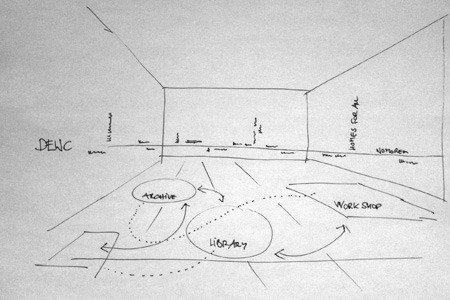Elke Krasny
dal 15/11/2011 al 24/2/2012
Segnalato da
15/11/2011
Elke Krasny
Audain Gallery SFU Woodward's, Vancouver
Mapping the Everyday examines the possibilities for and consequences of community-based political activity as articulated in relationship with contemporary artistic and institutional practices.

This process-oriented exhibition is a collaborative project between the Downtown Eastside Women's Centre (DEWC), visiting artist Elke Krasny, the art collective desmedia, the collective red diva projects, the collective Coupe, Out of Bounds: Festival of Site-Specific Interventions, students from the School for the Contemporary Arts at Simon Fraser University, and the Audain Gallery.
The DEWC is a self-initiated and self-organized space. Emerging out of what is now known as second wave feminism, women in the neighbourhood founded the centre in 1978. In many ways, it is an example of bottom-up feminist urbanism. In its day-to-day operation, the centre primarily represents Indigenous and older Chinese women, as well as other women of the Downtown Eastside community. What the women of the centre have claimed—and are still claiming—addresses and embodies all of the larger social, political, and economic transformations that have challenged the Downtown Eastside of Vancouver. These claims in fact constitute a vivid and vital historical mapping of the neighbourhood. Cecily Nicholson, a coordinator of the centre, significantly enabled the involvement of the DEWC in this collaboration.
Elke Krasny is a project-based artist and curator concerned with counter-hegemonic and feminist strategies of intervening in historical narratives, and with creating new constellations in the exchange of different forms of knowledge. The collaboration between the DEWC, Krasny, and the Audain Gallery centers on a research-based mapping that draws from the archival materials from the DEWC. Presented as a text-based "horizon line" spanning the walls of the gallery, the exhibition offers a visual map of the demands and aspirations of the DEWC community. These demands, both current and historical, address issues of poverty, violence and insecurity, social exclusion, the deferral of rights, and the legacy of colonialism. Although describing specific challenges, these claims are also expressions of conviviality and solidarity. These expressions exist between women, between women and their neighbourhoods, and between the women of the centre and their global context.
Beginning their practice in the early 2000s, desmedia provided access to the tools and training necessary for members of the Downtown Eastside community of Vancouver to self-produce their own media representations. As part of this practice, desmedia collected a large archive of interviews on digital video and other kinds of artwork. On the occasion of this exhibition, Krasny and the Audain Gallery have invited members of desmedia to reassemble their archive and to publicly debate its future.
Playwright and performer Marie Clements has a history of collaboration with the DEWC. Based on a series of workshops with the women of the DEWC, Clements and her collaborator MIchelle St. John, working as red diva projects, will produce a new performance work for the exhibition that explores the potential of fiction to express critical truth. Like Krasny, red diva projects explores writing as both a collective process and a process of collectivization formed by way of an expressive multitude of subjectivities.
By initiating this collaboration, Sabine Bitter, the curator of the Audain Gallery, is expanding and changing the institutional parameters of the position, function, and mode of operation of a contemporary art gallery. This important, necessary form of "self-challenging of the institution" (and perhaps also "institutional self-challenging") reacts to a setting defined by rapid urbanization, gentrification, and the all-inclusive yet reductive scope of neo-liberal economics, a setting in which the Audain Gallery is ultimately situated.
During the exhibition, the gallery will function as a platform and meeting ground for the production and exchange of different forms of knowledge. The "horizon line" will be a framing device and backdrop for a series of events, workshops, performances, and projects that aim to build neighbourhood constellations that go beyond familiar exchanges. They also provide opportunities for direct community participation and the fostering of critical dialogue, while also challenging the conventional expectation of what constitutes a gallery exhibition. As part of the series, women from the DEWC will teach a series of hands-on workshops, including instruction on cedar weaving and the sewing of button-blankets, to share their knowledge of traditional artistic practices.
A full schedule of the events, workshops, performances, and projects can be found by following the "Workshops" link on this site.
Working closely with the women of the DEWC, Elke Krasny, and our other collaborators, Mapping the Everyday examines the possibilities for and consequences of community-based political activity as articulated in relationship with contemporary artistic and institutional practices.
Mapping the Everyday: Neighbourhood Claims for the Future is realised in partnership with the Downtown Eastside Women's Centre with support from the City of Vancouver's 125th Anniversary Grants Program; the Austrian Federal Ministry for Education, Arts, and Culture; the Vancity Office of Community Engagement as part of Simon Fraser University Woodward's Cultural Unit; and the English Department of Simon Fraser University.
Opening: Nov. 16, 7pm
Audain Gallery SFU Woodward's
Goldcorp Centre for the Arts
149 West Hastings Street - Vancouver
Tue-Sat: 12pm-6pm



